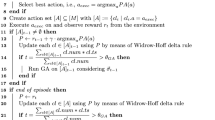Abstract
A Learning Classifier System has been developed based on industrial experience. Termed iLCS, the methods were designed and selected to function with common data properties found in industry. Interestingly, it considers a different strategy to XCS type systems, with the rule discovery being based panmictically. In order to show the worth of the iLCS approach, the benchmark data-mining application of the Wisconsin Breast Cancer dataset was investigated. A competitive level of 95.3% performance was achieved; mainly due to the introduction of a generalisation pressure through a fitness to mate (termed fertility) that was decoupled from a fitness to effect (termed effectiveness). Despite no subsumption deletion being employed the real-valued rule-base was simple to understand, discovering similar patterns in the data to XCS. Much further testing of iLCS is required to confirm robustness and performance. Currently, the iLCS approach represents a flexible alternative to niche-based LCSs, which should further the advancement of the LCS field for industrial application.
Preview
Unable to display preview. Download preview PDF.
Similar content being viewed by others
References
Wilson, S.W.: State of XCS Classifier System Research. In: Lanzi, P.L., Stolzmann, W., Wilson, S.W. (eds.) IWLCS 1999. LNCS (LNAI), vol. 1813, pp. 63–82. Springer, Heidelberg (2000)
Bernadó, E., Llorà, X., Garrell, J.M.: XCS and GALE: a Comparative Study of Two Learning Classifier Systems on Data Mining. In: Lanzi, P.L., Stolzmann, W., Wilson, S.W. (eds.) IWLCS 2001. LNCS (LNAI), vol. 2321, pp. 115–133. Springer, Heidelberg (2002)
Dixon, P.W., Corne, D.W., Oates, M.J.: A Preliminary Investigation of Modified XCS as a Generic Data Mining Tool. In: Lanzi, P.L., Stolzmann, W., Wilson, S.W. (eds.) IWLCS 2001. LNCS (LNAI), vol. 2321, pp. 133–151. Springer, Heidelberg (2002)
Llorà, X., Garrell, J.M.: Co-evolving Different Knowledge Representations with Finegrained Parallel Learning Classifier Systems. In: Proceeding of the Genetic and Evolutionary Computation Conference (GECCO 2002), pp. 934–941. Morgan Kaufmann, San Francisco (2002)
Browne, W.N.L.: The Development of an Industrial Learning Classifier System for Application to a Steel Hot Strip Mill, Doctoral Thesis, University of Wales, Cardiff (1999)
Holland, J.H.: Adaptation in Natural and Artificial Systems. University of Michigan Press, Ann Arbor (1975)
Wilson, S.W.: Classifier Fitness Based on Accuracy. Evolutionary Computation 3(2), 149–175 (1995)
Kovacs, T.: Deletion Schemes for Classifier Systems. In: Wolfgang, B., Daida, J., Eiben, A.E., Garzon, M.H., Honavar, V., Jakiela, M., Smith, R.E. (eds.) Proceedings of the Genetic and Evolutionary Computation Conference (GECCO 1999), pp. 329–336. Morgan Kaufmann, San Francisco (1999)
Horn, J., Goldberg, D.E., Deb, K.: Implicit Niching in a Learning Classifier System: Nature’s Way. Evolutionary Computation 2(1), 37–66 (1994)
Wilson, S.W.: ZCS: A Zeroth Level Classifier System. Evolutionary Computation 2(1), 1–18 (1994)
Wilson, S.W.: Mining Oblique Data with XCS. In: Lanzi, P.L., Stolzmann, W., Wilson, S.W. (eds.) IWLCS 2000. LNCS (LNAI), vol. 1996, p. 158. Springer, Heidelberg (2001)
Smith, R.E., Goldberg, D.E.: Reinforcement Learning with Classifier Systems: Adaptive Default Hierarchy Formation. Applied Artificial Intelligence 6(1), 79–102 (1992)
Blake, C., Merz, C.: UCI repository of machine learning databases (1998), Available at: http://www.ics.uci.edu/~mlearn/MLRepository.html
Lanzi, P.L.: A Study of the Generalization Capabilities of XCS. In: Proc. 7th Int. Conf. on Genetic Algorithms, pp. 418–425. Morgan Kaufmann, USA (1997)
Michalewicz, Z., Fogel, D.B.: How to Solve It: Modern Heuristics. Springer, Heidelberg (2000)
Fairley, A., Yates, D.F.: Inductive operators and rule repair in a Hybrid Genetic Learning System: Some Initial Results. In: Fogarty, T.C. (ed.) AISB-WS 1994. LNCS, vol. 865, pp. 166–179. Springer, Heidelberg (1994)
Venturini, G.: Adaptation in Dynamic Environments through a Minimal Probability of Exploration. In: Cliff, D., Husbands, P., Meyer, J.A., Wilson, S.W. (eds.) From Animals to Animats 3: Proceedings of the Third International Conference on Simulation of Adaptive Behaviour, pp. 371–379. MIT Press, Cambridge (1994)
Frey, P.W., Slate, D.J.: Letter Recognition Using Holland-Style Adaptive Classifiers. Machine Learning 6, 161–182 (1991)
Holmes, J.H., Lanzi, P.L., Stolzmann, W., Wilson, S.W.: Learning Classifier Systems: New Models, Successful Applications. In: Information Processing Letters (2002) (to appear), http://world.std.com/~sw/pubs.html
Wilson, S.W.: Get Real! XCS with Continuous-Valued Inputs. In: Booker, L., Forrest, S., Mitchell, M., Riolo, R.L. (eds.) Festschrift In Honor of John H. Holland, Centre for the Study of Complex Systems, pp. 11–121 (1999)
Koza, J.R.: Genetic Programming: on the Programming of Computers by Means of Natural Selection (Complex Adaptive Systems). MIT Press, Cambridge (1992)
Kovacs, T.: Strength or accuracy? A comparison of two approaches to fitness calculation in learning classifier systems. In: Wu, A.S. (ed.) Proceedings of the 1999 Genetic and Evolutionary Computation Conference Workshop Program, pp. 258–265 (1999)
Butz, M.V., Wilson, S.W.: An Algorithmic Description of XCS, Technical Report 2000017, Illinois Genetic Algorithms Laboratory, Illinois (2000), http://prediction-dynamics.com/
Carse, B., Pipe, A.G.: Involving Temporal Rules with the Delayed Action Classifier System - Analysis and New Results. In: Parmee, I.C. (ed.) Adaptive Computing in Design and Manufacture V, pp. 31–242. Springer, London (2002)
Author information
Authors and Affiliations
Editor information
Editors and Affiliations
Rights and permissions
Copyright information
© 2003 Springer-Verlag Berlin Heidelberg
About this paper
Cite this paper
Browne, W.N.L. (2003). Balancing Specificity and Generality in a Panmictic-Based Rule-Discovery Learning Classifier System. In: Lanzi, P.L., Stolzmann, W., Wilson, S.W. (eds) Learning Classifier Systems. IWLCS 2002. Lecture Notes in Computer Science(), vol 2661. Springer, Berlin, Heidelberg. https://doi.org/10.1007/978-3-540-40029-5_1
Download citation
DOI: https://doi.org/10.1007/978-3-540-40029-5_1
Publisher Name: Springer, Berlin, Heidelberg
Print ISBN: 978-3-540-20544-9
Online ISBN: 978-3-540-40029-5
eBook Packages: Springer Book Archive




